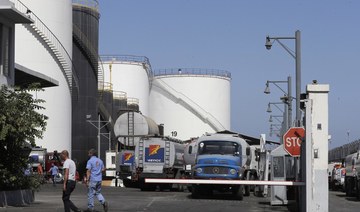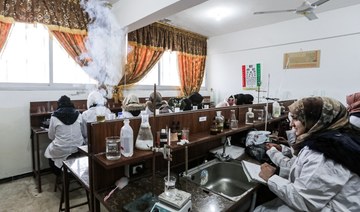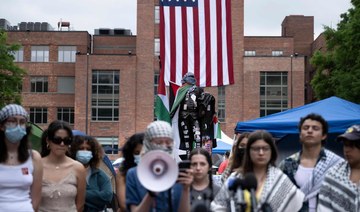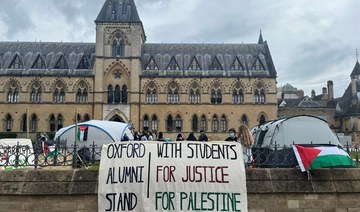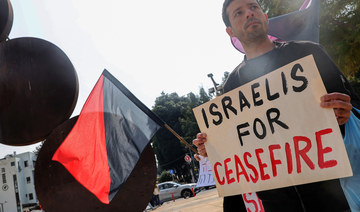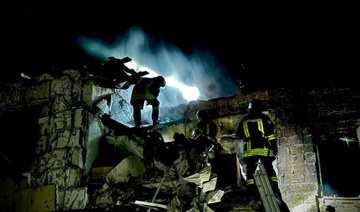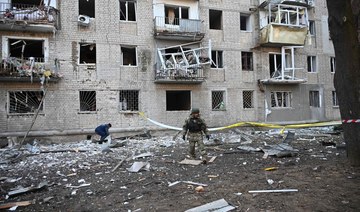BIALYSTOK, Poland: After enduring a decade of war in Syria, Boshra Al-Moallem and her two sisters seized their chance to flee. Her brother, who escaped years earlier to Belgium, had saved enough money for their trip, and word was spreading online that a new migration route into Europe had opened through Belarus.
But the journey proved terrifying and nearly deadly. Al-Moallem became trapped at the border of Belarus and Poland for 20 days and was pushed back and forth between armed guards from each side in an area of swamps. She endured cold nights, mosquitoes, hunger and terrible thirst. Only after she collapsed from exhaustion and dehydration did Polish guards finally take her to a hospital.
“I didn’t expect this to happen to us. They told us it’s really easy to go to Europe, to find your life, to run (from) war,” the 48-year-old said as she recovered this week in a refugee center in eastern Poland. “I didn’t imagine I would live another war between the borders.”
Al-Moallem is one of thousands of people who traveled to Belarus in recent weeks and were then pushed across the border by Belarusian guards. The European Union has condemned the Belarusian actions as a form of “hybrid war” against the bloc.
Originally from Homs, Al-Moallem was displaced to Damascus by the war. She said Belarusian officials tricked her into believing the journey into the EU would be easy and then used her as a “weapon” in a political fight against Poland. But she also says the Polish border guards were excessively harsh, denying her water and using dogs to frighten her and other migrants as the guards pushed them back across to Belarus, over and over again.
For years, people fleeing war in the Middle East have made dangerous journeys across the Mediterranean and Aegean seas, seeking safety in Western Europe. But after the arrival of more than a million people in 2015, European Union nations put up concrete and razor-wire walls, installed drone surveillance and cut deals with Turkey and Libya to keep migrants away.
The far less protected path into the EU through the forests and swamps of Eastern Europe emerged as a route only after the EU imposed sanctions on the regime of the authoritarian Belarusian President Alexander Lukashenko, following a flawed election and a harsh crackdown on protesters.
Suddenly people from Iraq, Syria and elsewhere were flying to Minsk, the capital of Belarus, on tourist visas and then traveling by car — many apparently aided by smugglers — to the border.
The three EU countries that border Belarus — Poland, Lithuanian and Latvia — accuse Lukashenko of acting to destabilize their societies.
If that is indeed the aim, it is working. Poland denied entry to thousands of migrants and refused to let them apply for asylum, violating international human rights conventions. The country has had its behavior criticized by human rights groups at home and abroad.
Stanislaw Zaryn, a spokesman for Poland’s special services, told The Associated Press that Polish forces always provide help to migrants if their lives are endangered. In other cases, while it might pain them not to help, Zaryn insisted that Poland must hold its ground and defend its border because it is being targeted in a high-stakes standoff with Belarus, which is backed by Russian President Vladimir Putin.
“Poland is of the opinion that only by thoroughly securing our border with Belarus are we able to stop this migration route, which is a route artificially created by Lukashenko with Putin’s support. It was artificially created in order to take revenge on the entire European Union,” Zaryn said.
With six migrants found dead along the border so far and small children returned to Belarus this week, human rights workers are appalled. They insist Poland must respect its obligations under international law to allow the migrants to apply for asylum, and not push them back across the border.
“The fact that these are Lukashenko’s political actions directed against Poland and directed against the European Union is obvious to us,” said Marianna Wartecka with the refugee rights group Fundacja Ocalenie. “But this does not justify the actions of the Polish state.”
Archbishop Wojciech Polak, the head of Poland’s Roman Catholic Church, also weighed in, giving his support to medics seeking access to the border to help. “We should not allow our brethren to suffer and die on our borders,” he said.
Lukashenko denies that his forces are pushing people into Poland, but his state media have seized on Poland’s response to depict the EU as a place where human rights are not respected.
After traveling from Syria to Lebanon, Al-Moallem, who was an English teacher in Syria, flew to Minsk, and from there took a taxi with her sisters and a brother-in-law to the border. Belarusian forces then guided the group to a spot to cross into Poland.
Crying as she told her story in English, Al-Moallem said that Belarusian forces told them: “It’s a really easy way to get to Poland. It’s a swamp. Just go through the swamp and up the hill, and you will be in Poland.”
“And when we were trying to get up the hill, Polish border guards pushed us back. Families, women, men, children. The children were screaming and crying,” she recalled. “I was asking Polish border guards, ‘Please just a drop of water. I’m so thirsty. I’ve been here without a drop of water.’”
But all they would do is snap back: “Go to Belarus. We are not responsible for you.”
That happened repeatedly, with the Belarusian forces taking them back, sometimes giving them nothing more than some bread, and then returning them the next night.
During her ordeal, she took videos of the desperate migrants with her phone and posted some to Facebook. Her videos and her account to the AP provide rare eyewitness evidence of the crisis at the border.
Such scenes unfold largely out of public view because Poland, following Lithuania and Latvia, declared a state of emergency along the border, which prevents journalists and human rights workers from going there.
The Polish government’s measures, which also involve bolstering border defenses with soldiers, are popular with many Poles. The conservative ruling party, which won power in 2015 on a strong anti-migrant platform, has seen its popularity strengthen in opinion polls amid the new crisis.
Despite Poland’s efforts, there are reports that some asylum-seekers have managed to cross into the EU undetected and headed farther west, often to reunite with relatives in Germany.
Al-Moallem says she and her relatives plan to leave the center where they are staying now and travel across the EU’s open borders to their brother in Belgium. They plan to seek asylum there. All she wants, she said, is for her family to be reunited after years of trauma and “to feel safe.”
Migrants on new route to Europe get trapped between borders
https://arab.news/ndw36
Migrants on new route to Europe get trapped between borders
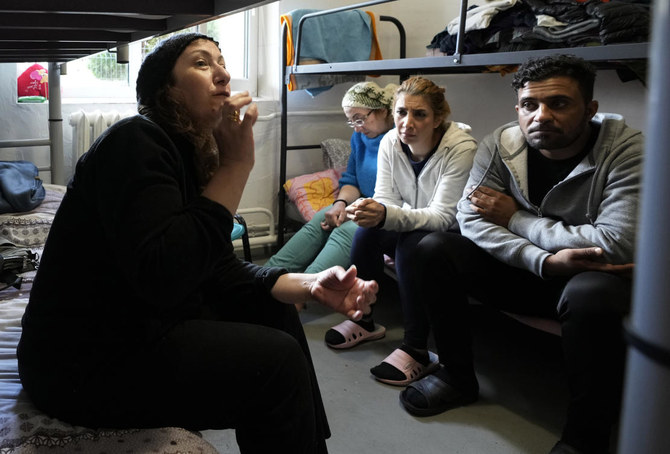
- A Syrians woman became trapped at the border of Belarus and Poland for 20 days
- Boshra Al-Moallem is one of thousands of people who traveled to Belarus in recent weeks and were then pushed across the border by Belarusian guards
Mic cuts out as graduating student tells Columbia to act over Gaza

- Saham David Ahmed Ali demanded the college call for a ceasefire in the war-torn enclave, reveal its business dealings with companies linked to Israel
- Microphone cut out mid-speech, leading to fellow graduates booing and chanting ‘let her speak’
- Columbia has witnessed serious protests in recent weeks, with hundreds of students arrested
LONDON: A microphone briefly cut out this week during a speech given at a graduation ceremony at Columbia University in the US, during which the speaker criticized the university’s stance on Gaza.
On Tuesday, student Saham David Ahmed Ali was giving a speech to graduates at the Mailman School of Public Health, in which she called for action against Israel and criticized the “silence on Columbia University’s campus.”
The microphone began to cut out during her speech, leading to students booing and chanting “let her speak” as Ali paused. She was later able to continue. It is unclear if the issue was caused by a technical fault or if the microphone was muted deliberately.
Ali said the university needed to reveal its dealings with companies “profiting off of Palestinian genocide” and that it should immediately divest from them.
She also demanded Columbia call for an immediate ceasefire in Gaza, where Palestinian civilians currently face famine, according to the UN, as Israel continues its military campaign that has left over 35,000 people dead, many thousands more wounded, and hundreds of thousands displaced following the attack by Hamas on Israel on Oct. 7.
Columbia has witnessed significant protests across its campus since April 17 after the university’s president, Minouche Shafik, testified before the US Congress about alleged incidents of antisemitism against Jewish students on its grounds.
Protestors have subsequently occupied parts of the campus including the university’s Hamilton Hall. The New York Police Department has arrested hundreds of people over the protests, which have also sparked similar movements at other major US colleges, as well as counter-demonstrations by students with Israeli and US flags.
Columbia has also taken the unusual step of canceling its commencement ceremony this year in the wake of the protests, only holding school-specific graduation ceremonies.
Defense team says 9 Egyptians accused of causing deadly shipwreck misidentified as crew

- Adriana, an overcrowded fishing trawler, sank on June 14 off southeastern coast of Greece
- Only 104 survived out of 500-700 Pakistanis, Egyptians, Syrians and Palestinians aboard ship
ATHENS, Greece: The legal defense team for nine Egyptian men due to go on trial in southern Greece next week accused of causing one of the Mediterranean’s deadliest shipwrecks said Thursday they will argue that Greece has no jurisdiction in the case, and insisted their clients were innocent survivors who have been unjustly prosecuted.
The nine, whose ages range from early 20s to early 40s, are due to go on trial in the southern city of Kalamata on May 21 on a series of charges, including migrant smuggling, participation in a criminal organization and causing a deadly shipwreck. They face multiple life sentences if convicted.
The Adriana, an overcrowded fishing trawler, had been sailing from Libya to Italy with hundreds of asylum-seekers on board when it sank on June 14 in international waters off the southwestern coast of Greece.
The exact number of people on board has never been established, but estimates range from around 500 to more than 700. Only 104 people survived — all men and boys from Syria, Egypt, Pakistan and two Palestinians — and about 80 bodies were recovered.
The vessel sank in one of the Mediterranean’s deepest areas, making recovery efforts all but impossible.
The Greek lawyers who make up the defense team spoke during a news conference in Athens on Thursday. They maintained their clients’ innocence, saying all nine defendants had been paying passengers who had been misidentified as crew members by other survivors who gave testimonies under duress just hours after having been rescued.
The nine “are random people, smuggled people who paid the same amounts as all the others to take this trip to Italy aiming for a better life, and they are accused of being part of the smuggling team,” lawyer and defense team member Vicky Aggelidou said.
Dimitris Choulis, another lawyer and member of the legal team, said that Greek authorities named the defendants as crew members following testimonies by nine other survivors who identified them for having done things as simple as handing bottles of water or pieces of fruit to other passengers.
“For nearly a year now, nine people have been in prison without knowing what they are in prison for,” Choulis said.
“For me, it is very sad to visit and see people in prison who do not understand why they are there,” he added.
While the Adriana was sailing in international waters, the area was within Greece’s search and rescue zone of responsibility. Greece’s coast guard had been shadowing the vessel for a full day without attempting a rescue of those on board. A patrol boat and at least two merchant ships were in the vicinity when the trawler capsized and sank.
In the aftermath of the sinking, some survivors said the coast guard had been attempting to tow the boat when it sank, and rights activists have accused Greek authorities of triggering the shipwreck while attempting to tow the boat out of Greece’s zone of responsibility.
Greek authorities have rejected accusations of triggering the shipwreck and have insisted the trawler’s crew members had refused to accept help from the nearby merchant ships and from the Greek coast guard.
A separate investigation being carried out by Greece’s naval court hasn’t yet reached any conclusion, and the defense team hasn’t been given any access to any part of it.
The Egyptians’ defense team also argues that because the shipwreck occurred in international waters, Greek courts don’t have jurisdiction to try the case, and the defense will move to have the case dismissed on those grounds when the trial opens in Kalamata next week.
Greece lies along one of the most popular routes into the European Union for people fleeing war and poverty in the Middle East, Africa and Asia. While most of those cross into the country’s eastern Aegean Sea islands from the nearby Turkish coast, others try to skirt Greece altogether and head from north Africa to Italy across the longer and more dangerous Mediterranean route.
On Thursday, Greece’s coast guard said that 42 people had been rescued and another three were believed to be missing after a boat carrying migrants sent out a distress call while sailing south of the Greek island of Crete.
Officials said they were alerted by the Italian coast guard overnight about a boat in distress 27 nautical miles (31 miles or 50 kilometers) south of Crete. Greece’s coast guard said that 40 people were rescued by nearby ships, and another two were rescued by a Greek navy helicopter.
A search and rescue operation was underway for three people reported by survivors as still missing. It wasn’t immediately clear what kind of vessel the passengers had been on, or why the boat sent out a distress call.
Police dismantle pro-Palestinian encampment at DePaul University in Chicago

- All of the protesters at the encampment “voluntarily left” the area when police arrived early Thursday
- The move to clear the campus comes less than a week after the school’s president said public safety was at risk
CHICAGO: Police began dismantling a pro-Palestinian encampment early Thursday at DePaul University in Chicago, hours after the school’s president told students to leave the area or face arrest.
Officers and workers in yellow vests cleared out tents and camping equipment at the student encampment, leaving behind yellow squares of dead or dying grass where the tents had stood. Front-loaders were being used to remove the camping equipment.
Just across the street from where the encampment was spread across a grassy expanse of DePaul’s campus known as “The Quad,” a few dozen protesters stood along a sidewalk in front of a service station, clapping their hands in unison as an apparent protest leader paced back and forth before them, speaking into a bullhorn.
All of the protesters at the encampment “voluntarily left” the area when police arrived early Thursday, said Jon Hein, chief of patrol for the Chicago Police Department.
“There were no confrontations and there was no resistance,” he said at a news briefing. “As we approached, all the subjects voluntarily left the area.”
Hein said, however, that two people, a male and female in their 20s, were arrested outside the encampment “for obstruction of traffic.”
The move to clear the campus comes less than a week after the school’s president said public safety was at risk.
The university on Saturday said it had reached an “impasse” with the school’s protesters, leaving the future of their encampment on the Chicago campus unclear. Most of DePaul’s commencement ceremonies will be held the June 15-16 weekend.
In a statement then, DePaul President Robert Manuel and Provost Salma Ghanem said they believe that students intended to protest peacefully, but “the responses to the encampment have inadvertently created public safety issues that put our community at risk.”
Efforts to resolve the differences with DePaul Divestment Coalition over the past 17 days were unsuccessful, Manuel said in a statement sent to students, faculty and staff Thursday morning.
“Our Office of Public Safety and Chicago Police are now disassembling the encampment,” he said. “Every person currently in the encampment will be given the opportunity to leave peacefully and without being arrested.”
He said that since the encampment began, “the situation has steadily escalated with physical altercations, credible threats of violence from people not associated with our community.”
Students at many college campuses this spring set up similar encampments, calling for their schools to cut ties with Israel and businesses that support it, to protest lsrael’s actions in the war with Hamas. The protests began as schools were winding up their spring semesters and are now holding graduation ceremonies.
Separately, some students and faculty were detained Wednesday after police removed an encampment and pro-Palestinian protesters briefly took over a lecture hall at the University of California, Irvine. There was a large law enforcement response when demonstrators demanding the university divest from Israel blocked the building’s entrance with a makeshift barricade. Police declared an unlawful assembly, cleared the building and took an unknown number of people into custody.
Also Wednesday, 11 members of a group protesting at the University of Tennessee in Knoxville who did not vacate the area despite repeated warnings were arrested for trespassing, the university said in a statement. Those arrested included three students and eight people who are not affiliated with the university. Any students who were arrested will also be referred to student conduct, officials said.
“The University of Tennessee respects individual’s rights to free speech and free expression and is committed to managing the campus for all,” the university said in the statement. “We will continue to be guided by the law and university policy, neutral of viewpoint.”
Tensions at DePaul flared the previous weekend when counterprotesters showed up to the campus in the city’s Lincoln Park neighborhood and prompted Chicago police to intervene.
The student-led DePaul Divestment Coalition, who are calling on the university to divest from Israel, set up the encampment April 30. The group alleged university officials walked away from talks and tried to force students into signing an agreement, according to a student statement late Saturday.
“I don’t want my tuition money to be invested in my family’s suffering,” Henna Ayesh, a Palestinian student at DePaul and Coalition member, said in the statement.
DePaul is on the city’s North Side. Last week, police removed a similar encampment at the University of Chicago on the city’s South Side.
The Associated Press has recorded at least 79 incidents since April 18 where arrests were made at campus protests across the US More than 2,900 people have been arrested on the campuses of 60 colleges and universities. The figures are based on AP reporting and statements from universities and law enforcement agencies.
South Africa tells UN court Israel ‘genocide’ hit ‘new and horrific stage’
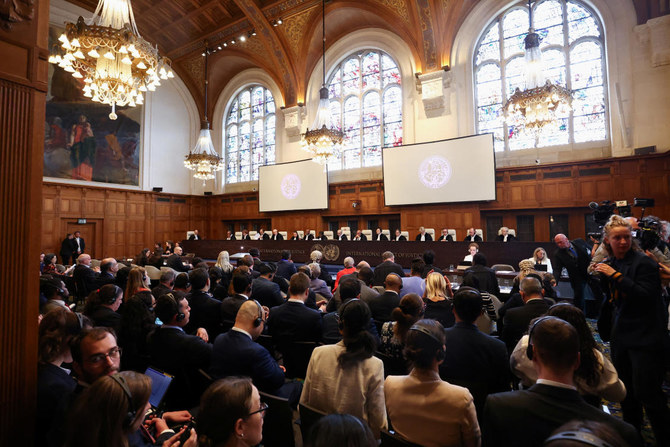
- ICJ heard a litany of allegations against Israel from lawyers representing Pretoria, including mass graves, torture, and deliberate withholding of humanitarian aid
- Top lawyer Vusimuzi Madonsela said: “Israel’s genocide has continued apace and has just reached a new and horrific stage”
THE HAGUE: South Africa accused Israel Thursday at the top UN court of stepping up what it called a “genocide” in Gaza, urging judges to order a halt to the Israeli assault on Rafah.
The International Court of Justice (ICJ) heard a litany of allegations against Israel from lawyers representing Pretoria, including mass graves, torture, and deliberate withholding of humanitarian aid.
Israel will respond on Friday. It has previously stressed its “unwavering” commitment to international law and described South Africa’s case as “wholly unfounded” and “morally repugnant.”
“South Africa had hoped, when we last appeared before this court, to halt this genocidal process to preserve Palestine and its people,” said top lawyer Vusimuzi Madonsela.
“Instead, Israel’s genocide has continued apace and has just reached a new and horrific stage,” added Madonsela.
South Africa was kicking off two days of hearings at the Peace Palace in The Hague, home of the ICJ, imploring judges to order a ceasefire throughout Gaza.
In a ruling that made headlines around the world, the ICJ in January ordered Israel to do everything in its power to prevent genocidal acts and enable humanitarian aid to Gaza.
But the court stopped short of ordering a ceasefire and South Africa’s argument is that the situation on the ground — notably the operation in the crowded city of Rafah — requires fresh ICJ action.
The Rafah campaign is “the last step in the destruction of Gaza and its Palestinian people,” argued Vaughan Lowe, a lawyer for South Africa.
“It was Rafah that brought South Africa to the court. But it is all Palestinians as a national, ethnical and racial group who need the protection from genocide that the court can order,” he added.
The orders of the ICJ, which rules in disputes between states, are legally binding but it has little means to enforce them.
It has ordered Russia to halt its invasion of Ukraine, to no avail.
South Africa wants the ICJ to issue three emergency orders — “provisional measures” in court jargon — while it rules on the wider accusation that Israel is breaking the 1948 UN Genocide Convention.
First, it wants the court to order Israel to “immediately withdraw and cease its military offensive” in Rafah.
Second, Israel should take “all effective measures” to allow “unimpeded access” to Gaza for humanitarian aid workers, as well as journalists and investigators.
Lastly, Pretoria asked the court to ensure Israel reports back on its measures taken to adhere to the orders.
Prime Minister Benjamin Netanyahu ordered the Rafah offensive in defiance of US warnings that more than a million civilians sheltering there could be caught in the crossfire.
Netanyahu argued Wednesday that “we have to do what we have to do” and insisted that mass evacuations there had averted a much-feared “humanitarian catastrophe.”
Just minutes before the court hearings opened, Israel’s Defense Minister Yoav Gallant said the operation in Rafah “will continue as additional forces will enter” the area.
The United Nations agency for Palestinian refugees, UNRWA, said Wednesday that 600,000 people have fled Rafah since military operations intensified, amid battles and heavy Israeli bombardment in the area.
“As the primary humanitarian hub for humanitarian assistance in Gaza, if Rafah falls, so too does Gaza,” said South Africa in a written submission to the court.
“The thwarting of humanitarian aid cannot be seen as anything but the deliberate snuffing out of Palestinian lives. Starvation to the point of famine,” said lawyer Adila Hassim, her voice choking with emotion.
Pretoria stressed that the only way for the existing court orders to be implemented was a “permanent ceasefire in Gaza.”
Israel’s military operations in Gaza were launched in retaliation for Hamas’s unprecedented October 7 attack which resulted in the deaths of more than 1,170 people, mostly civilians, according to an AFP tally of official Israeli figures.
Militants also seized about 250 hostages, 128 of whom Israel estimates remain in Gaza, including 36 the military says are dead.
Israel’s military has conducted a relentless bombardment from the air and a ground offensive inside Gaza that has killed at least 35,233 people, mostly civilians, according to Gaza’s Hamas-run health ministry.
Ukraine says it has checked Russia’s offensive in a key town, but Moscow says it will keep pushing

- Russian attempts to establish a foothold in the town of Vovchansk “have been foiled,” Ukraine’s general staff said in a midday report
- Six people were injured Thursday in one Russian daylight attack on Vovchansk using cluster munitions, local officials said
KYIV: Ukrainian units locked in street battles with the Kremlin’s forces in a key northeastern Ukraine town have halted the Russian advance, military officials in Kyiv claimed Thursday, though a senior Moscow official said the frontline push had enough resources to keep going.
Russian attempts to establish a foothold in the town of Vovchansk, which is among the largest towns in Ukraine’s northeastern Kharkiv region with a prewar population of 17,000, “have been foiled,” Ukraine’s general staff said in a midday report.
It was not possible to independently verify the claim.
Six people were injured Thursday in one Russian daylight attack on Vovchansk using cluster munitions, local officials said, as emergency workers and volunteers were rescuing people affected by shelling. Among the injured were two medics, he said.
Ukrainian authorities have evacuated some 8,000 civilians from the town. The Russian army’s usual tactic is to reduce towns and villages to ruins with aerial strikes before its units move in.
Vovchansk, located just 5 kilometers (3 miles) from the Russian border, has been a hotspot in the fighting in recent days. Russia launched an offensive in the Kharkiv area late last week, significantly adding to the pressure on Ukraine’s outnumbered and outgunned forces which are waiting for delayed deliveries of crucial weapons and ammunition from Western partners.
Russia has also been testing defenses at other points along the roughly 1,000-kilometer (620-mile) front line snaking from north to south through eastern Ukraine. That line has barely changed over the past 18 months in what became a war of attrition. Recent Russian attacks have come in the eastern Donetsk region, as well as the Chernihiv and Sumy regions in the north and in the southern Zaporizhzhia region. The apparent aim is to stretch depleted Ukrainian resources and exploit weaknesses.
Ukraine has repeatedly tried to strike behind Russian lines, often using drones though Russia’s response to the new technology used in unmanned vehicles has improved in recent months.
Russian naval aircraft Thursday destroyed 11 Ukrainian sea drones heading toward annexed Crimea in the western Black Sea, Russia’s Defense Ministry said, according to state news agency TASS.
Kyiv made no comment.
Ukrainian President Volodymyr Zelensky met with his top military commanders in Kharkiv on Thursday and said the region “is generally under control.” However, he acknowledged on social media that the situation is “extremely difficult” and said Ukraine was again strengthening its units in Kharkiv. Zelensky also met with wounded soldiers and handed out medals.
“We clearly see how the occupier is trying to distract our forces and make our combat work less concentrated,” he said in his nightly video address Wednesday.
Former Russian defense minister and now the head of the presidential Security Council Sergei Shoigu insisted Russian troops are pushing the offensive in many directions and that “it’s going quite well.”
“I hope we will keep advancing. We have certain reserves for the purpose, in personnel, equipment and munitions,” he said in televised remarks.
The Institute for the Study of War, a Washington-based think tank, calculated that Russian forces attacking in Kharkiv have advanced no more than 8 kilometers (5 miles) from the shared border.
It reckons Moscow’s main aim in Kharkiv is to create a “buffer zone” that will prevent Ukrainian cross-border strikes on Russia’s neighboring Belgorod region.
US Secretary of State Antony Blinken, in a two-day visit to Kyiv this week, sought to reassure Ukraine of continuing American support. He announced a $2 billion arms deal, with most of the money coming from a package approved last month.
Ukrainian officials say their needs are urgent, and Western partners have vowed to expedite deliveries of military hardware.
NATO Military Committee Chair Rob Bauer on Thursday urged senior officers from the 32-nation alliance to send more arms and ammunition to Ukraine, even if that means ignoring weapons stock guidelines.
“If faced with a choice between meeting the NATO capability targets or supporting Ukraine, you should support Ukraine,” he told a meeting of top defense brass in Brussels. “Stocks can and will be replenished. Lives lost are lost forever.”
Denmark is donating an extra 5.6 billion kroner ($814 million) to Ukraine, Danish Foreign Minister Lars Løkke Rasmussen said Thursday, with half going to air defense systems.
Meanwhile, Russian President Vladimir Putin sought to consolidate ties with China with an official visit to Beijing.
China has backed Russia diplomatically over its invasion of Ukraine and is now an important export market for Russian oil and gas. Moscow also has turned to Beijing for high-tech products.



